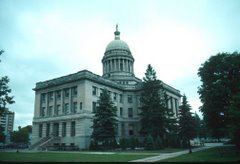12/22/06 Legislature OKs new health building
(as Published in the Cortland Standard, Corey Preston reporting)
A proposal to build a 15,300-square-foot county public health facility on
Ultimately, the Legislature voted 13-6 in favor of purchasing $894,000 worth of property for the project — a 2/3 majority was required to pass — but not before legislators both for and against the purchase called three separate recesses and went into executive session in an effort to whip up votes.
The county is looking to build the facility, which would include the Mental Health Department and the Public Health Department, on 2.46-acres of land on
The total project could cost approximately $5.5 million, according to County Administrator Scott Schrader, about $3 million of which would come from the county’s tobacco settlement money, and the rest of which would need to be bonded for.
Had the Legislature voted against the property acquisition, or had it tabled the issue until next month, the deal essentially would have been dead, Schrader said, because the county’s options on the nine parcels it will acquire expire today.
County officials announced the proposed project at a news conference Wednesday, and the fact that some legislators didn’t hear about the project until then became an issue Thursday night, as did the fact that residents living near the site also were in the dark.
“I literally found out about this today at work when somebody asked if my house was going to be demolished too,” said Pete Snell, who lives at
“Those properties on William, Randall, Church and Cedar streets — we’ve put a lot of money into our homes, they’ve become very coveted neighborhoods, and I don’t want a parking lot in my back yard,” Wilcox said. Wilcox and Snell’s appeals sparked the first lengthy recess of the night, and appeared to also incite the ire of legislators upset with the short notice the legislature and the community had to respond to the proposed project. “The public is just finding about it tonight, so I’m not going to support it at this point,” Mike McKee (R-Cincinnatus,
Minority Leader Danny Ross (R-Cortlandville) agreed. “I think ultimately it’s probably a good project, but I don’t like not informing all the legislators from the beginning,” Ross said. “I think if there had been more communication we could’ve talked about changing the layout and looked at having parking someplace else, and we wouldn’t have had all these problems.”
Sandy Price (D-Harford and Virgil) voted in favor of the property purchase, but not before expressing similar concerns.
“I think the concept is excellent. I think consolidating those services in one place is a great idea, and I think it’s a good location,” Price said. Still, Price struggled with her vote, she said. “But the short notice — considering the cost of the project and the worries of the public — really set me back,” she said. “We didn’t have an opportunity to touch base with our town boards and the key people in our community, and with a project this big, I think we should have time to do that.”
Legislator questions executive session
Newell Willcox (R-Homer) was visibly upset after the meeting because of an executive session, during which the public is asked to leave the room, which he felt was unnecessary. “There was nothing said that couldn’t have been said in public,” said Willcox, who, with Larry Cornell (R-Marathon and Lapeer), voted against going into executive session. “I believe in full transparency and what was said was nothing more than a pep talk to sway some votes.”
The session was aimed at getting Van Donsel’s opinion on the voting strength requirements for a potential vote, County Administrator Scott Schrader said, and to discuss the impact of turning the purchase options for the properties down or deferring a vote until next month. “It’s never a good idea to negotiate property acquisitions in public,” Schrader said. “All it does, frankly, is cost you money.” Closing the session’s door to the public to receive a legal opinion is legal, although it wouldn’t fall under the purview of “executive session,” said Bob Freeman, director of the New York State Committee on Open Government, “If the purpose of the session was to enable the attorney to give legal advice to the county Legislature, that would be an exemption from open meetings law,” Freeman said.
Still, Willcox argued that there was little legal advice given during the session.
“Basically we were told, ‘If you vote against this tonight, then in any further negotiation, the prices will go up,’” Willcox said. “But we already knew that, we knew the prices, everyone did — they were printed on the front page of the paper.”
Willcox’s characterization of the closed session caused Freeman to question his initial assessment.
“If it was advice anybody would’ve given, it doesn’t seem like there was a basis for closing the doors,” Freeman said.





No comments:
Post a Comment